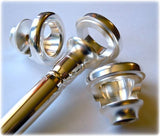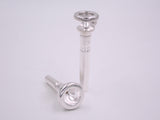A.T.V. - Advanced Training Visualizer - Trumpet/Cornet
ATV shank sold separately (works with any backbore with Warburton Threads)
Scroll down for instructions!
Visualizers have been used successfully as a diagnostic tool by brass teachers since the 1920's. Our approach with the A.T.V. goes far beyond visual diagnostics, providing an advanced, high-intensity Isotonic workout and low-intensity exercises to develop a relaxed aperture for greatly improved tone in the lower and middle registers.

The objective is simple: To create a strong vibrant buzz across the entire width of the aperture (rim to rim). The A.T.V. provides an unadulterated raw assessment of the state of your buzz and becomes the ideal tool for making improvements in that area.
The results are stunning: In addition to muscle conditioning, the A.T.V. will help you learn to maximize the quality of your buzz in the lower, middle, and upper registers - which will translate into very substantial results when playing your trumpet.
Chad Shoopman talks about the A.T.V.
Gerry Lopez and Bill Carmichael demonstrate lower and upper register exercises using the A.T.V.
______________________________________________

"After playing the A.T.V. I returned to my normal mouthpiece and my sound production was much better. It's also an excellent chop stimulant for persons like myself that wake up with swollen and stiff chops."
Joenuel Lebron
Mark Anthony tour
______________________________________________

I received my A.T.V. in the mail yesterday and tried it out this morning. All I can say is wow! After doing the exercises on the A.T.V., my trumpet playing had more core and stability. Doing lip slurs on the A.T.V. revealed to me that my air flow was not as supported as I would like, and I was easily able to go to work on improving in that area of my playing. My low and high range also improved as well, and feels easier! Thanks so much for your hard work in designing a great product!
John Malloy
Freelance Classical Trumpeter
Baltimore, MD
PS. I also have been using P.E.T.E. for around a year, and have also felt more strength develop in my embouchure muscles, which has helped me develop more core in my sound! Thanks!
______________________________________________

I've been playing for 14 years (including a "frustation" hiatus that lasted maybe 4 years) since I first took up the trumpet at the age of 28. I've played in a number of amateur groups over the years including: rock bands, brass ensembles, concert bands and an amateur symphony orchestra. UnfortunateIy, during all this time I struggled with technical issues that severely limited my progress and it was only my love of the instrument that kept me going. Suffering as I did with these problems, my trumpet playing became very hard work and so I spent many years reading books, randomly switching mouthpieces and making embouchure tweaks - all of which created an analysis leading to paralysis situation.
All of this started changing when I got my ATV. The ATV exposed some basic embouchure flaws that I am now slowly addressing. For years I had been using a large aperture that sounded great in the lower register but which forced me to use extreme mouthpiece pressure as early as top of the staff. The pressure killed my endurance and my range was pitiful. Daily use of the ATV in spare moments such as while driving to work has forced me into using a smaller aperture and the transformation, while not complete, is remarkable. My tone, range and endurance have all dramatically improved and I am getting compliments from my fellow trumpeters who are noticing the change. I thank you again for all your help. I am enjoying my trumpet more than I have done for years and I will be recommending Warburton and the ATV to anyone who will listen.
Fergus McCann
Dublin, IRELAND
______________________________________________
The Warburton A.T.V.:
- Engages the full range of motion of your embouchure muscles (relaxed to full contraction).
- Improves control and power of both breathing and buzzing.
- Is suitable for use by all players. Don't let the "Advanced" part scare you away - the low-intensity buzz improvement exercises are well suited for ALL players!
- Is available in all Warburton rim sizes to match your mouthpiece diameter.
Ken Titmus Explains the A.T.V.
A.T.V. fits the Warburton backbore/shank you may already have,
or you can order a low-cost shank made especially for use with the A.T.V.

Note that the low-cost A.T.V. shank does not have (or need) a hole bored through it. It's exactly the same as our regular backbores, except that we reduced the cost by not finishing the interior bore.
When using your A.T.V. there is no sound or air moving through the trumpet which means you may use a shank with or without the bored hole - they both work the same for A.T.V. use.
______________________________________________
What size A.T.V. do you need ?
If you already play a Warburton mouthpiece, all the A.T.V. rim diameters are the same as our regular mouthpieces. For example, if you play a Warburton 4SV you would want the size 4 A.T.V.
If you play another manufacturer's mouthpiece, our trumpet mouthpiece comparison chart may be able to help you find the Warburton size that matches your mouthpiece. For example, if you play a Schilke 15 you should order the size 3 A.T.V.
______________________________________________
Instructions for Use - Warburton A.T.V. (Advanced Training Visualizer)
Use the A.T.V. to develop a relaxed aperture
A relaxed aperture will greatly improve tone and efficiency.
Start a buzz on the A.T.V. in a register where you can get a full, naturally loud buzz.
Buzz a descending scale while trying to maintain a full buzz along the entire width of your aperture (from rim to rim).
Hint: Do not relax the support muscles around the aperture.
During the following days, try to work down to lower pitches. If you can buzz down to a low C on the A.T.V., you are doing great – into the pedal register, fantastic!
When first starting out, even many experienced players cannot do this exercise well at all. They quickly improve and then are pleasantly surprised to hear an amazing improvement in lower and middle register tone quality.
Use the A.T.V. for a high intensity workout
These advanced exercises will push the limits of your physical capabilities.
Advanced Exercise 1:
Start in the middle register. Ascend upwards in siren-like glides extending your reach each time. Go for the highest pitch you can reach without a thinning of the sound or excessive arm pressure. You may be surprised at the amount of resistance that is created with this exercise. The A.T.V. will not allow you to have success until your breath is highly compressed and solidly supported and your aperture is relaxed!
This is a very intense exercise intended for advanced players. Avoid pushing yourself beyond natural limits. You wouldn't go into a gym and begin with the heaviest weights without warming up, so likewise, don't attempt these without a good warm-up first.
These ascending exercises are ISOTONIC, because they involve an active use of the muscles from relaxed to fully contracted. Our good friend and dealer in Japan, Taijiro Takeura, has published some good information about isometric vs isotonic exercises which can be viewed here.
Advanced Exercise 2:
This exercise combines Isometric and Isotonic techniques to build powerful control.
Quickly ascend to the highest pitch you can achieve without strain or excess pressure. Immediately begin a slow, siren-like descending glide. Time your descent so that your entire air supply is depleted when you arrive at your target pitch.
As you gain strength over the following weeks, the parameters on both ends will increase.
This exercise can be compared to curling a barbell to your chest, and lowering it back down very slowly. It is very challenging and very taxing because you're focusing on TWO things simultaneously:
- learning how to maintain a proper buzz across the entire aperture throughout the exercise
- learning how to adjust embouchure muscle contraction as needed
- all while getting the workout needed for the muscle conditioning process.
Remember, your muscles will only rebuild and gain strength during the rest time which follows - Please allow this process the time it needs to work. Regular practice will not interfere with your progress, but wait at least 48 hours until your next attempt at this exercise.
______________________________________________







